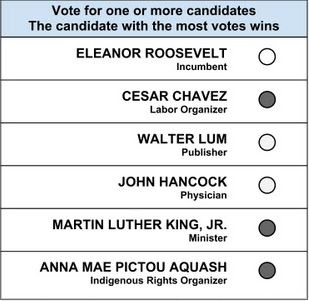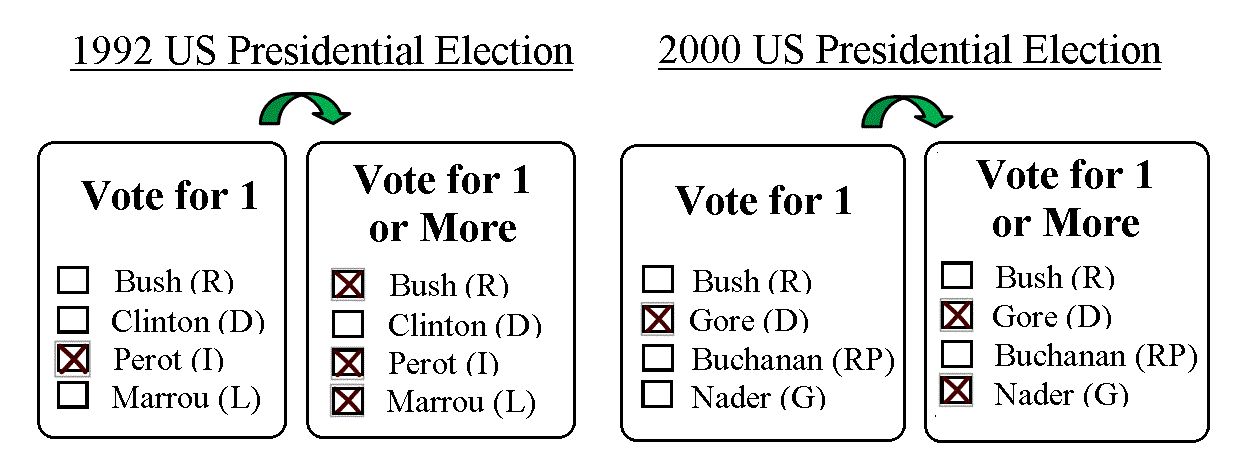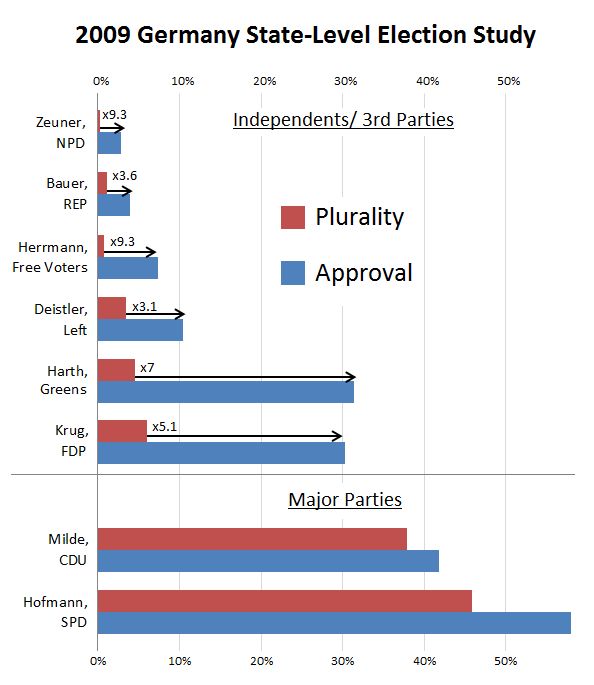Approval Voting: A Voice for Independents

We Have a Representation Problem
America hates Independents. At least it gives that impression. Independents take just two of the 535 seats in Congress and only 20 of these outsiders sit among the nation’s 7,382 state legislators.
Yet, 40% of Americans identify as Independent. How could Independents be so underrepresented—by a factor of over 100?
Answer: Our vote-for-one Plurality Voting system suffocates Independents. Plurality ensures this result by coercing voters away from their honest favorites. No one wants to throw away their only vote on a less-than-viable candidate. And it’s this dishonest voting under Plurality that explains the disconnect with whom we elect.
But Plurality goes past denying Independents election. It stifles their growth and political speech by distorting their support. And Plurality’s distortion encourages an environment where it’s okay to give Independents scarce media coverage and exclude them from debates.
On presidential debates, for example, the major parties use a private debate commission run by former heads of both parties’ national committees. This commission requires presidential candidates to poll 15% nationally according to five different pollsters. And these polls come with the same Plurality Voting issues so that any Independent getting 15% is nearly impossible.
In 2000, the major parties’ commission decided Nader wasn’t popular enough to debate. Nader was popular enough, however, to sell out the 15,000-seat Madison Square Garden and get enough votes for the major parties to label him a spoiler. The debate commission again excluded him (and everyone else) in 2004 and 2008. They also excluded Perot during his second run in 1996. Independents have an uphill battle getting into local debates as well.
These obstacles assume the major parties even let Independents on the ballot. The US has some of the harshest ballot access laws in the world for Independents. For instance, Georgia’s law is so tough that an Independent hasn’t been on its US House ballot in over half a century. But why fight ballot-access laws for Independents that you won’t vote for or see in debates?
Solution: Count All the Votes with Approval Voting
We need a voting system that lets you vote your honest favorites—always. Enter Approval Voting. Approval Voting is simple. The ballot looks like Plurality, most votes wins, and you still just check off candidates (no ranking). But Approval Voting lets you pick as many as many candidates as you wish. And that’s crucial.
To take this in, imagine Plurality compared to Approval Voting for the 1992 and 2000 US Presidential elections. (See figure.) How would you vote?
Want to show support for your favorites? No worries there. Want to hedge your bets with a compromise vote against your least favorite? You can do that, too. Approval Voting lets you do both at the same time.
Approval Voting Breaks Plurality’s Funhouse Mirror
Plurality Voting cripples Independents through artificially low support. Conversely, Approval Voting avoids this when it lets voters choose their favorites. So it makes sense that Approval Voting would give Independents more accurate support.
And it does. A 2009 German study looked at this question for its state elections. Approval Voting gave Independent/third-party candidates roughly five times more support than with Plurality. (See figure.)
French researchers had this same question during their 2007 presidential election. And that election had 12 candidates. Voters there gave non-major candidates over three times more support with Approval Voting than under Plurality. (See figure.)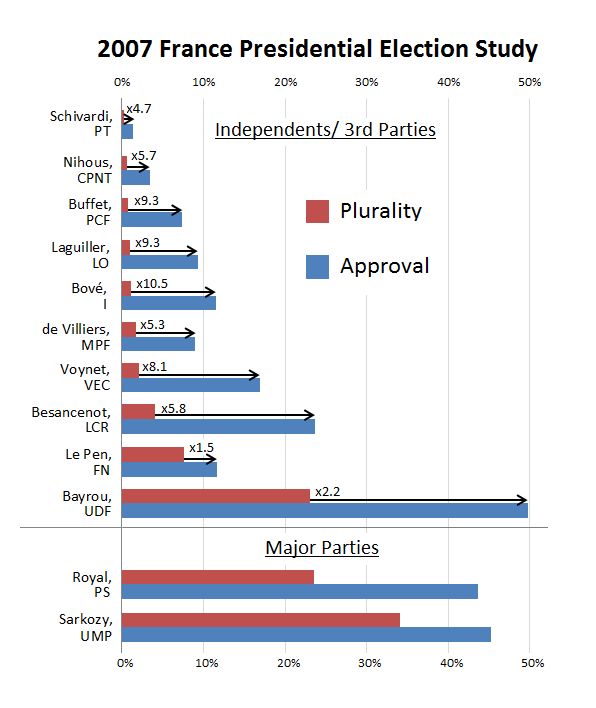
In that election, Plurality eliminated the third-placed (and third-party) Centrist candidate before the runoff. Under Approval, that eliminated Centrist candidate would have won. So not only does Approval Voting give more accurate measures of support, it can also change election outcomes. Here, it (unsurprisingly) chose the Centrist.
Finally, US researchers looked at Approval Voting in the 1992 presidential election. There, billionaire Ross Perot still lost, but he got significantly more votes. (See figure.) Also, Clinton was the clear winner and surpassed the 50% approval mark once Approval Voting fixed the vote-splitting issue.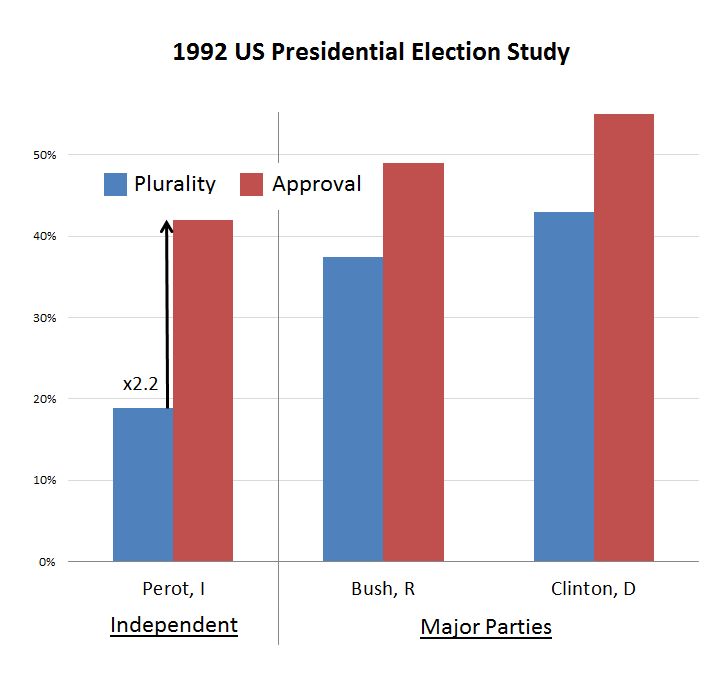
Keep Approval Voting in Your Thoughts
As you think about how life couldn’t be any harsher for Independents, know that it can at least be better. Our democracy is only as good as its voting system. The US uses winner-take-all elections. And Approval Voting can operate within that framework for both local and federal elections.
Independent candidates need a voting system that accurately measures their support before they can get anywhere. Approval Voting achieves that. And it may be the only way Independents ever get their voice. It’s up to you to tell others about Approval Voting.
______________________________________________________________________________________________________________________________________
About The Center for Election Science:
The Center for Election Science is a nonpartisan nonprofit that studies and promotes better electoral systems. As an organization, they dedicate themselves to scholarship related to election systems. Their purpose is to educate the general public and advocate election systems that most benefit social welfare.
